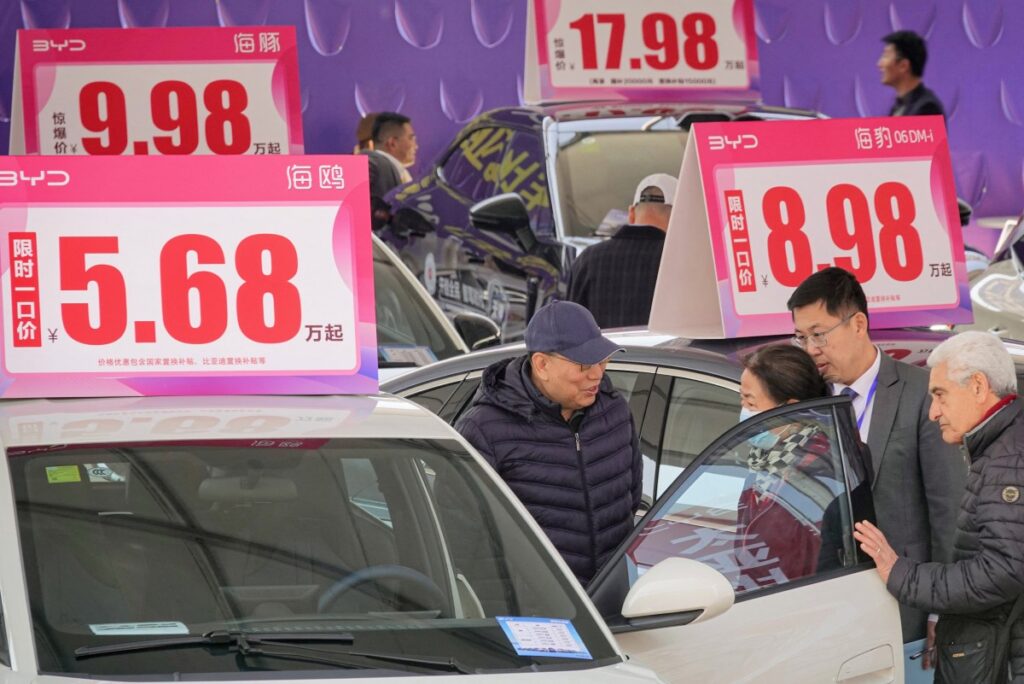June 30, 2025
SINGAPORE – China has introduced legal measures to halt businesses’ race to the bottom, as it continues to crack down on price-cutting practices that are hurting the economy.
The country’s top legislative body on June 27 passed amendments to a law against “unfair competition”, including one that prohibits platform operators from compelling their vendors to sell items at below cost price.
The amended law, state broadcaster CCTV said on June 28, will regulate “involutional competition” such as the “frenzied lowering of prices” on e-commerce platforms, and food delivery platforms’ use of hefty subsidies to wrest a share of the market.
Coffee and bubble tea, for instance, can sell for as little as 1.68 yuan (30 Singapore cents) after discounts on JD.com on the 18th day of each month, as the retail giant doles out 10 billion yuan in subsidies to muscle into the food delivery business.
Platform operators found to have compelled vendors to sell items at less than cost price could now be fined as much as 2 million yuan in serious cases.
“Involution”, or neijuan in Chinese, refers to unproductive competition in a crowded field that results in diminishing returns – in this case the vicious circle of lowering prices and product quality, which the authorities aim to curb. Instead, industry players will be guided towards upgrading their services, CCTV said.
“A major economic challenge China faces is the risk of sustained deflation, which is exacerbated by neijuan,” said economics professor Hu Guangzhou of the China Europe International Business School in Shanghai.
Macquarie economists said in a note in June that China is contending with its longest deflationary streak in the past four decades. This reflects cautious consumer spending and how factories have been churning out more goods than are needed.
The country’s gross domestic product deflator, which measures broad changes in prices of goods and services across the economy, has fallen for eight consecutive quarters. Prices of goods leaving factories have been dropping for more than two years.
Aside from deflation, Prof Hu said that weak demand and price competition resulting from involution were forcing firms to live with lower profit margins. This, in turn, deprives companies of the resources needed to innovate, and to pay their workers adequately.
In the fiercely competitive electric vehicle sector, for instance, Chinese automakers have been slashing prices to vie for a slice of the domestic market.
The latest round of price cuts was sparked in May by industry leader BYD, which reduced prices by as much as 34 per cent. Its cheapest model now costs just 55,800 yuan (S$9,900).
In Prof Hu’s view, platform operators have been singled out in the revised law because their market dominance can give them an unfair advantage in dealing with vendors.
Most of these vendors are small or micro enterprises that generate many jobs, he said. “When their profit margins are squeezed by the platform operators, it generates a detrimental knock-on effect on the economy.”
The new regulations, reported by the Xinhua news agency on June 27, include a provision mandating that big companies avoid setting unreasonable payment terms and methods for smaller players.
Local media outlet Yicai reported in June that small companies serving the car industry have been facing significant delays in receiving payments from the large firms they work with.
According to the outlet’s research, it took eight listed battery manufacturers an average of 255 days to pay their suppliers, even though they themselves got paid in an average of 103 days.
Prof Hu believes that the new law, which takes effect in October, will help make China’s economy more efficient, but adds that more will need to be done to combat involution and break the deflationary cycle.
“Greater fiscal stimulus and higher household income are necessary to raise the levels of consumption and start the reflation process,” he said.
Joyce ZK Lim is The Straits Times’ China correspondent, based in Shenzhen.

